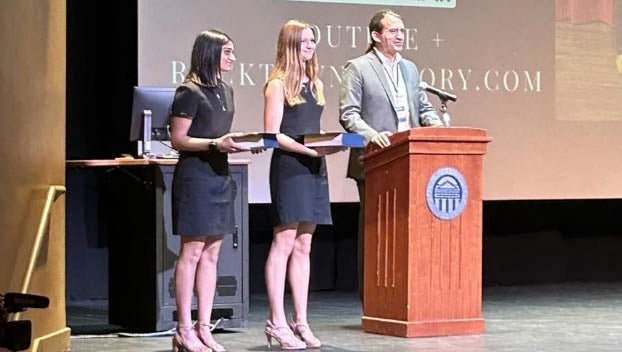Students ‘embody spirit of Barbara Johns’ through Change Awards
Published 12:48 am Monday, May 6, 2024
|
Getting your Trinity Audio player ready...
|
A leader in the Civil Rights Movement and Prince Edward County historical icon is still making an impact today. Students are following in the footsteps of Barbara Rose Johns, a civil rights activist whose actions as a teenager leading a student strike later influenced the landmark U.S. Supreme Court Brown v Board of Education case. This year, the Virginia Council for the Social Studies debuted its inaugural Barbara Johns Youth Change Agent Awards. The awards are inspired by Johns’ legacy of fighting for equal educational opportunities at her high school in Farmville in 1951.
“As we went to create this new award, we really did want to highlight a heroine of Virginia, but also honor her legacy and honor how impactful this is not only for schools in Virginia but schools across the nation,” said Samantha Futrell, president of the Virginia Council for the Social Studies. “Barbara Johns made all these sacrifices to essentially do what she believed was right and galvanize her fellow students into action.”
What are the Change Awards?
The Youth Change Agent Awards highlights K-12 Virginia students who “contributes to their local community through service efforts, positively impacts their school climate through equity initiatives, and exhibits leadership capabilities and/or potential,” according to the criteria listed on the award’s website.
A student who is chosen for the Change Awards receives $250 and recognition at the Virginia Council for Social Studies annual conference.
“Really anyone who found themselves embodying the spirit of Barbara Johns could apply for this award,” said Futrell. “I was really excited not only for the opportunity for students to nominate themselves, but also for teachers and supervisors to nominate students in their community who they thought to be embodying the characteristics of Barbara Johns – her spirit of being a change agent in her community.”
Futrell said they had many submissions and were excited about the high turnout for the awards. The council picked two winners this year – a duo who created a documentary highlighting the desegregation of schools in Warren County and Charlottesville.
“I found the documentary to be incredibly impactful. It is something that I plan to use with the students in my classes,” said Futrell.
Choosing the winners
The inaugural Youth Change Agent Award winners were Spotswood High School seniors Elizabeth Kidd and Pria Dua. It took the team more than a year to research, interview, film, and edit the documentary. The students pulled from library archives and interviewed former students who were a part of integrating Warren County and Charlottesville schools. One of their subjects was Charles Alexander, one of the “Charlottesville Twelve” who first attended the all-white Venable Elementary School in September 1959.
“It is the work of true historians. They were able to take a topic within history, understand that there was a void, talk to people who had been victims and overcame active resistance, and they were able to allow space for those people to tell their stories,” said Futtrell. “They were able to synthesize all that into a documentary that was not only well-produced, but fact-based with primary sourcing, while also giving tons of space to the actual people who were involved in all this. This is what historians in the field aspire to do, and these were students in high school.”
Futrell said they also formed friendships with the former students and historical figures – going above and beyond the award’s original criteria.
“The friendships that were developed personally gave them a fire to make sure their stories were told,” said Futrell.
Kidd and Dua’s documentary, titled “Knocking Down Walls: The Deliberate Speed of Harrisonburg’s Federal Court” highlighted school desegregation cases decided in Harrisonburg. The students showcased a mini version of the documentary at the Virginia Council for the Social Students conference. They presented at their own session, showing teachers how they can do similar projects in their own classrooms. Nearly 400 educators registered for this year’s conference.
The two students also got the opportunity to meet Barbara Johns’ sister, Joan Johns Cobbs. She spoke after Dua and KIdd received their award, sharing her experiences in the school strike and how her sister impacted her as a family member and as a changemaker in the pivotal moment in history.
“She did so much not only for Prince Edward County, but for Virginia, but also for our nation as a whole, and we really wanted to honor her and her legacy. I think having her sister come to the conference this year was a huge part of that as well,” said Futrell.
Who was Barbara Johns?
Johns was a 16-year-old junior at Moton High School in Farmville when she organized a student strike for better conditions at the all-Black school. During the strike, the students sought legal counsel from the NAACP, which led to the organization filing the Davis v County School Board of Prince Edward County. This later became part of Brown v Board of Education – and was the only student-led case that was a part of the legal challenge.
Johns later faced threats and violence as retaliation for the court filing. She was sent to live with her uncle in Montgomery, Alabama for her safety, and completed her senior year there.
Futrell said Dua and Kidd embodied the spirit of Johns and her legacy through their documentary.
“It drove them to create a product that was not only impactful to their community and not just their school,” said Futrell. “I think that’s what we’re looking for in future applicants as well – students that are involved in their community, but also understanding the impact of the work that they can do outside of the walls of their school.”
Next month, a statue of Johns will replace the statue of Confederate General Robert E Lee in the United States Capitol’s National Statuary Hall Collection.
“I think that Barbara Johns’ legacy lives on in the hearts of anyone in Virginia who can see injustice and wants to make a change to create a more equitable system,” said Futrell. “I think one of the things Barbara Johns was most inspiring for is that she was not afraid to make a statement and she was not afraid to call for a change and I think we all can learn from that bravery.”






